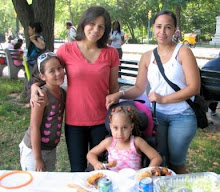Friday, February 4, 2011
The Diet and Disability Connection
Is there a connection between disability and the food we eat? That question was very much on Lizette Dunn-Barcelona's mind. The Associate Director of Sinergia had searched for years for different ways to cope with her daughter's severe asthma. "My 14 year old would frequently have bouts of hay fever, and since we were unable to control her asthma at home, she was often hospitalized - for days - until her breathing was normalized," explains Ms. Dunn-Barcelona. She had often wondered about the effects that certain foods had on allergies, and then two years ago she read that gluten accumulates in the body and inhibits its ability to fight environmental toxins. "I decided to limit my daughter's gluten intake during allergy season, between March and May, and noticed a significant difference in her body's response. She still sneezed all the time and got asthma, but we were able to control it from home and she wasn't hospitalized," adds the mother of two.
Last December Ms. Dunn-Barcelona attended a workshop offered by Sinergia entitled "Alternative Nutrition for Children with Disabilities: Gluten Free Diets". Her son had been recently diagnosed with ADHD, and having had such positive results by changing her daughter's diet, she was very interested in the topic. The instructor, Kristin Boncher, who is founder of WhatToFeedYourKids.com, talked about her own child and how through food she got him to be more responsive to his environment, interact with people and break free of whatever had a hold of him. She achieved this by removing gluten, soy and dairy from his diet. Since Ms. Dunn-Barcelona's family was already diary free, and because of the success she had when limiting her daughter's gluten intake, she decided to eliminate all three of those foods from her household, commencing in February 2011. In order to get her family onboard with the idea, she took on the role of guinea pig, and on December 23, 2010 embarked on her food "experiment".
"I felt more energetic and was able to focus more easily at work. I purchased gluten, soy and diary free bread, pasta and cheese and incorporated them into my diet. On January 9, 2011, I was celebrating my birthday and ate a slice of birthday cake; it was regular cake filled with gluten. Within 20 minutes I felt as if someone had given me a sedative. I was unable to concentrate, and lost my focus at work. The entire day I felt sluggish and tired. I began to think about my son and wondered if his inability to concentrate is exacerbated by the cloudiness caused by the food I'm feeding him. All along I've been limiting his sugar intake, but never thought about removing anything else."
Ms. Dunn-Barcelona immediately went back on her diet and can't think about turning back. She has learned what to buy and how to cook it and is feeling better because of the changes she's made. "I'm looking forward to introducing my family to new, healthy ways of eating, and hopefully completely eliminating my daughter's allergy and helping my son on his quest to deal better with his diagnosis," she says.
Sinergia is offering 3 upcoming workshops on the topic of Alternative Nutrition for Children with Disabilities: Gluten Free Diets, on March 3rd, Reading Labels: Choosing Healthier Foods with Less Chemicals, on March 9th and Implementing a Dairy Free Diet for Kids, on April 14th. To register for these FREE events, please call Gina Peña-Campodonico at 212 643-2840, ext. 305 or by e-mail at gpena@sinergiany.org.
Photo credit
Subscribe to:
Post Comments (Atom)












No comments:
Post a Comment